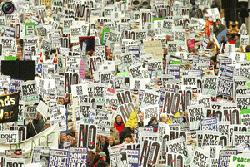Rhode Island – The U.S. war in Iraq has cost $1.7 trillion with an additional $490 billion in benefits owed to war veterans, expenses that could grow to more than $6 trillion over the next four decades counting interest, according to a study by the Costs of War Project by the Watson Institute for International Studies at Brown University released on Thursday.
The report comes as coordinated blasts killed at least 25 people in the heart of Baghdad on Thursday near the heavily fortified Green Zone, where several Western embassies are located.
The work of about 30 academics and experts, the report was published in advance of the 10th anniversary of the U.S.-led invasion of Iraq on March 19, 2003.
It was also an update of a 2011 report the Watson Institute produced ahead of the 10th anniversary of the September 11 attacks that assessed the cost in dollars and lives from the resulting wars in Afghanistan, Pakistan and Iraq.
The 2011 study said the combined cost of the wars was at least $3.7 trillion, based on actual expenditures from the U.S. Treasury and future commitments, such as the medical and disability claims of U.S. war veterans.
That estimate climbed to nearly $4 trillion in the update.
The estimated death toll from the three wars, previously at 224,000 to 258,000, increased to a range of 272,000 to 329,000 two years later.
Excluded were indirect deaths caused by the mass exodus of doctors and a devastated infrastructure, for example, while the costs left out trillions of dollars in interest the United States could pay over the next 40 years.
The interest on expenses for the Iraq war could amount to about $4 trillion during that period, the report said.

The report also examined the burden on U.S. veterans and their families, showing a deep social cost as well as an increase in spending on veterans. The 2011 study found U.S. medical and disability claims for veterans after a decade of war totaled $33 billion. Two years later, that number had risen to $134.7 billion.
In related news, fighting lasted about an hour in Baghdad after lethal coordinated bombings, ending with security forces storming the building, killing the gunmen and evacuating hundreds of people who had hunkered down in their offices, according to police.
There was no immediate claim of responsibility.
The attack erupted shortly after midday in Baghdad’s Allawi area, a largely commercial area is home to the Iraqi National Museum and the city’s main bus station.
At least two blasts, including one car bomb and another believed to be from a suicide bomber, went off near a building currently housing the Justice Ministry. A police officer who was among the troops sent to clear the area said that approximately six gunmen wearing police uniforms quickly stormed the building.
“Everybody panicked (after the first blast) and seconds later we heard a second explosion. I looked through the window and I saw some gunmen wearing police uniforms entering the building. We knew that these policemen were fake,” said Asmaa Abbas, a Justice Ministry employee who was working in her third-floor office.
A gun battle quickly broke out between the intruders and security forces, as other explosions went off near the bus station and the headquarters for a VIP protection force that provides bodyguards for lawmakers, government ministers and other senior officials.
After about an hour, security forces stormed the building and some of the gunmen detonated explosives they were wearing, the officer on the scene said.
“It was the longest hour in my life,” said Abbas, the employee.
Deputy Justice Minister Busho Ibrahim said there were more than 1,000 people in the four-story building at the time of the attack. He said the minister is abroad and was not inside.
“When the explosions and shooting started, the guards evacuated me out a back door, and I have no idea what happened after that,” he said, speaking over the telephone from outside the building.
The attack killed 22 people in addition to the gunmen and wounded 55 others, police said. The dead include seven police officers.
Hospital officials confirmed the casualty numbers. The officials spoke on condition of anonymity because they were not authorized to speak to the media.
Justice Ministry employees had moved to this facility after a 2009 attack on the nearby Ministry of Justice, which is now being repaired. That attack was part of a double car bombing which killed at least 147 people and heavily damaged the building.
-Reuters, AP






Leave a Reply